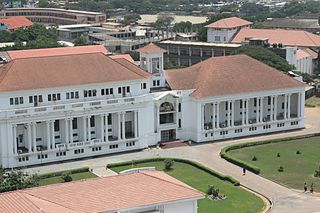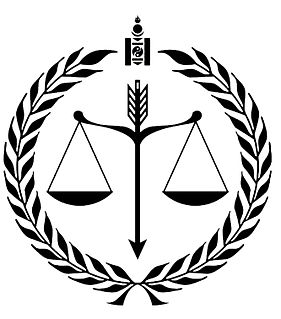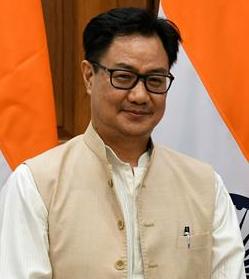
The United States Department of Justice (DOJ), also known as the Justice Department, is a federal executive department of the United States government tasked with the enforcement of federal law and administration of justice in the United States. It is equivalent to the justice or interior ministries of other countries. The department is headed by the U.S. Attorney General, who reports directly to the president of the United States and is a member of the president's Cabinet. The current attorney general is Merrick Garland, who was sworn in March 11, 2021.

The United States Court of Appeals for the Third Circuit is a federal court with appellate jurisdiction over the district courts for the following districts:

The United States Court of Appeals for the Fourth Circuit is a federal court located in Richmond, Virginia, with appellate jurisdiction over the district courts in the following districts:

The United States Court of Appeals for the District of Columbia Circuit is one of the thirteen United States Courts of Appeals. It has the smallest geographical jurisdiction of any of the U.S. federal appellate courts, and covers only one district court: the U.S. District Court for the District of Columbia. It meets at the E. Barrett Prettyman United States Courthouse, near Judiciary Square, Washington, D.C.

The chief justice of India, officially the chief justice of the Supreme Court of India, is the chief judge of the Supreme Court of India as well as the highest-ranking officer of the Indian federal judiciary. The Constitution of India grants power to the president of India to appoint, in consultation with the outgoing chief justice, the next chief justice, who will serve until they reach the age of sixty-five or are removed by impeachment. As per convention, the name suggested by the incumbent chief justice is almost always the next senior most judge in the Supreme Court.

The Ministry of Justice is one of the cabinet level ministries of the Japanese government. It is responsible for the judicial system, correctional services, and household, property and corporate registrations. It also serves as the government's legal representatives.

The Commission on Elections, usually abbreviated as COMELEC, is one of the three constitutional commissions of the Philippines. Its principal role is to enforce all laws and regulations relative to the conduct of elections in the Philippines.

The Calcutta High Court is the oldest High Court in India. It is located in B.B.D. Bagh, Kolkata, West Bengal. It has jurisdiction over the state of West Bengal and the Union Territory of the Andaman and Nicobar Islands. The High Court building's design is based on the Cloth Hall, Ypres, in Belgium.
The Chief Justice of Japan is the chief judge of the Supreme Court of Japan and is the head of the judicial branch of the Japanese government.

The Supreme Court of Arkansas is the highest court in the state judiciary of Arkansas. It has ultimate and largely discretionary appellate jurisdiction over all state court cases that involve a point of state law, and original jurisdiction over a narrow range of cases. The Supreme Court holds the power of judicial review, the ability to invalidate a statute for violating a provision of the Arkansas Constitution. It is also able to strike down gubernatorial directives for violating either the Constitution or statutory law. However, it may act only within the context of a case in an area of law over which it has jurisdiction.

The Supreme Court of Ghana is the highest judicial body in Ghana. Ghana's 1992 constitution guarantees the independence and separation of the Judiciary from the Legislative and the Executive arms of government.

San Beda College of Law is the law school college under the San Beda University, a private, Roman Catholic university run by the Benedictine monks in the Philippines.

The Chief Justice of Ghana is the highest-ranking judge of the Supreme Court of Ghana. The chief justice is also the head of the Judiciary of Ghana and is responsible for its administration and supervision. In order of state precedence, the chief justice is the fourth highest official in Ghana.

The Government of Tamil Nadu is the governing authority for the Indian state of Tamil Nadu. It is seated at Fort St George, Chennai. The legislature of Tamil Nadu was bicameral until 1986, when it was replaced by a unicameral legislature, like most other states in India.

The Ministry of Justice of the People's Republic of China is a government ministry under the State Council of China which is responsible for legal affairs. The range of responsibilities include judicial process, drafting legislation, developing legal framework, participating in national and international treaties, prosecution and sentencing.

The Justice Select Committee of the United Kingdom is a select committee of the House of Commons which scrutinizes the policy, administration, and spending of the Ministry of Justice. In addition, the committee examines the work of the Law Officers of the Crown, the Serious Fraud Office, and the Crown Prosecution Service. The committee also reviews draft Sentencing Guidelines issued by the Sentencing Guidelines Council.

The Justice Ministry is the Israeli government ministry that oversees the Israeli judicial system. Since 13 June 2021, Israel's Minister of Justice has been Gideon Sa'ar.

The Supreme Court of Mongolia is the highest court in the judicial system of Mongolia, and is generally the court of last resort for non-constitutional matters. It is established by Article 48(1) of the Constitution of Mongolia. The 1992 Constitution states in Article 50(1) that "the Supreme Court shall be the highest judicial organ".

The Minister of Law and Justice is the head of the Ministry of Law and Justice and one of the cabinet ministers of the Government of India. The first Law and Justice Minister of independent India was B. R. Ambedkar, who served in first Nehru ministry during 1947–52. Kiren Rijiju is the current Law and Justice Minister of India.

The 2022 Ohio general elections will take place on November 8, 2022, throughout the US state of Ohio.